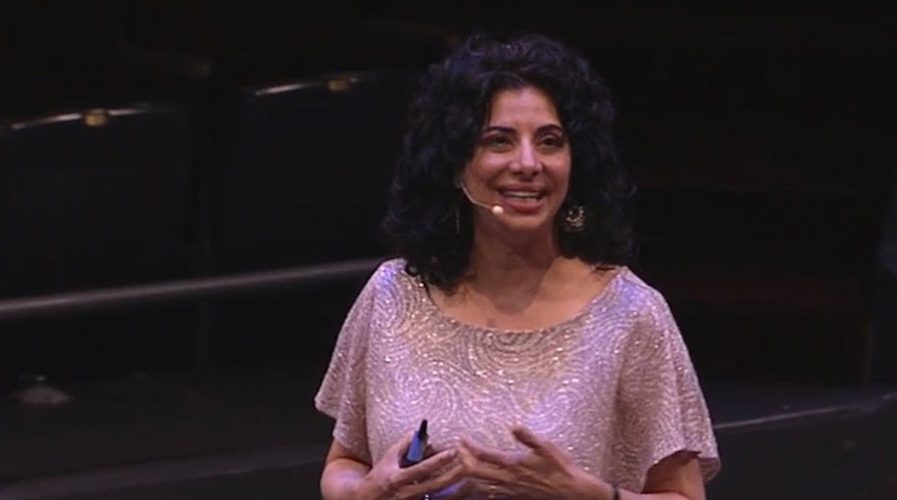
XPRIZE’s Zenia Tata talks abut how technology can lead the way in social change. Pic: Devex/YouTube
XPRIZE’s Zenia Tata : Spurring technology innovation in Asia and around the world
XPRIZE, an organization that calls itself an ‘innovation engine’, believes that “solutions can come from anyone, anywhere” and that “some of the greatest minds remain untapped”.
It’s a comforting mantra in a world that still faces grand challenges such as global climate change, growing food insecurity and water scarcity. But how do we harness these minds and create change? Through competition, of course.
Sponsored by the likes of Google, Shell and IBM, the U.S.-based XPRIZE pits entrepreneurs and engineers against each other to solve some of the world’s major challenges using technology, with the best winning a handsome monetary incentive.
Going global for the first time, XPRIZE has launched two new competitions out of India. The first offers entrepreneurs and scientists US$1.75 million to come up with a solution to alleviate the global water crisis by creating a device that extracts a minimum of 2,000 liters of water per day from the atmosphere using 100 percent renewable energy, at a cost of no more than 2 cents per liter.
#XPrize launches first programme outside US, announces two tech challenges in Indiahttps://t.co/ev5ptnY8pX pic.twitter.com/GfDBD7c6QR
— Digit (@digitindia) October 25, 2016
The second challenges teams to leverage technology to ensure women’s safety by creating a device that costs no more than US$40 a year but enables a women in danger to autonomously and inconspicuously trigger an emergency alert transmitting information to a network of community responders who can respond to her call within 90 seconds.
Tech Wire Asia sat down with Zenia Tata, Executive Director of Global Development at XPRIZE, to talk about the two new competitions and how entrepreneurs and technology can change the world for the better. Zenia has more than 21 years of experience in program design, management and business development for not-for-profit organizations and social enterprises.
Tell us more about the two new competitions XPRIZE has launched?
The first one is to address the issue of water scarcity. By 2025 two out of three people will live in extreme water scarcity. We are trying to come at the problem using technology but also trying to see if we can start new markets and new industries.
We have also launched a prize for women’s safety – but it is a prize for everybody, we are using women as a litmus test.
I will give you a quick couple of statistics: 4.8 billion people on our plant do not have the ability to call a universal emergency number like 911, and if they do have a number, most of the time there is no guarantee someone will help.
Safety is really a big global concern because governments cannot afford the kind of infrastructure needed to provide that kind of safety net so is it up to community, entrepreneurs and innovators to come in and provide that.
What the prize is trying to do is put the onus of safety back on community, where it belongs.
Today in a country like India, if something happens to a woman it is put on her. Why did you go out at night? Why didn’t you check this out beforehand? Why did you dress like that? Enough.
It is time to put the onus of safety back on society. So using tech we are trying to do something very ambitious, with this and many other XPRIZEs.
How many products borne out of XPRIZE competitions actually reach commercialization?
In terms of the XPRIZEs we have done, every single one of them becomes a real project by the end of the prize itself. We do not give awards for theory. You have to build it and prove it and you must hold it a real-life rigorous test environment.
Its time we take responsibility to keep women safe across the world. #WomenSafetyhttps://t.co/JZmkVN9GlE
— Zenia Tata (@zenia_tata) November 6, 2016
Once that happens we aim to open up a whole new market. For example, for the water prize, we are already working towards what we call ‘advanced market commitments’. So industry players, governments, private sector, investors, we are lining them up to showcase the top teams so they can then take those teams to scale and those products to go beyond being just a prototype.
For example, our Qualcomm Tricorder prize for a medical device that sits on the palm of your hand and can non-invasively diagnose a multitude of healthcare conditions, a lot of those products are at the prototype stage and are already on a path to commercialization.
They have already started getting investment, started to figure out their go-to-market strategy, and there are even some products that are commercialized.
Should healthcare be a key focus for tech innovators?

Pic: Pixabay
I think the next thing in healthcare to see innovation is going to be infrastructure as a whole as this is what is really pulling governments down because of the mounting expense.
For example, we are talking to the government of Singapore right now about how do we reduce the burden of hospital care for the elderly? How do we keep elders in their home for longer because of socialised medicine in a country like Singapore with an ageing population this can be a big drain on the economy?
What is the investment landscape in Asia like right now?
I think it is an amazing time to be an entrepreneur in Asia. Actually, in a country like India right now we have never seen a boom like this in entrepreneurship. I grew up in Mumbai and was educated there and left when I was in my 20s but have always gone back.
When I was growing up it was certainly unheard of to be an innovator or an inventor – you know? And now I see, in the last five to eight years, this amazing surge of entrepreneurship and innovation and, of course, that ecosystem only works if that is balanced on the other side with investment, so it is really the investors that are balancing this in a lot of ways.
SEE ALSO: Asia should invest billions in annual clean energy to combat climate change
Do you think there is enough focus on technology as a way to solve some of the world’s big challenges?
If you don't believe in climate change, then you will be on the wrong side of human history. #Climatechangeisreal https://t.co/dQ616yHgS1 pic.twitter.com/kTkVVvb8fn
— Zenia Tata (@zenia_tata) November 4, 2016
My work has mostly been in social entrepreneurship using technology and entrepreneurship as two sides of one coin to solve big problems. I have always worked with technology, but it is interesting that just the fact you are a social entrepreneur as opposed to a tech entrepreneur puts another patina on people’s impression of what you do.
It is considered something a lot softer, with a different kind of impact trajectory and that has been, honestly for me, a battle that I have fought for many years.
Technology for the betterment of humanity has the ability to reach markets of a billion people and that is something extremely powerful because technology is a real enabler to transform lives and the kinds of markets that technology can open in social and other realms, to me, is actually far greater than some old nanotech that is incredibly expensive and only a couple of pharmaceutical companies can afford for example.
READ MORE
- Ethical AI: The renewed importance of safeguarding data and customer privacy in Generative AI applications
- How Japan balances AI-driven opportunities with cybersecurity needs
- Deploying SASE: Benchmarking your approach
- Insurance everywhere all at once: the digital transformation of the APAC insurance industry
- Google parent Alphabet eyes HubSpot: A potential acquisition shaping the future of CRM
